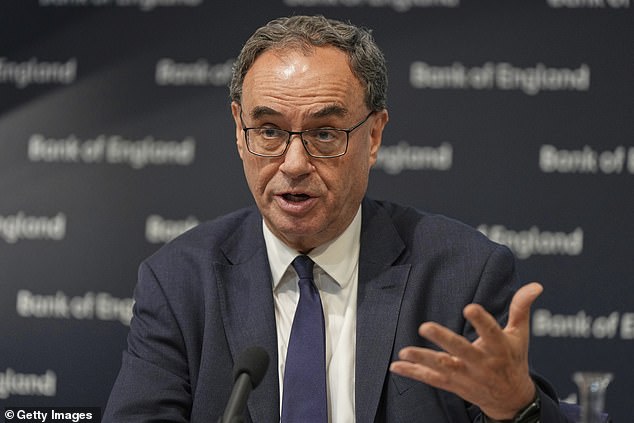A week can be a long time in finance.
At the International Monetary Fund in Washington just days ago, the governor of the Bank of England, Andrew Bailey, sounded sanguine about the fallout from the twin collapses of the Ohio motor parts group First Brands and US sub-prime car lender Tricolor.
There was vague talk about ‘lifting the drains’ and taking a look, but no sense of urgency.
It was left to JP Morgan’s Jamie Dimon, whose bank has an exposure to Tricolor, to refer to cockroaches in the system.
As if by magic, when I turned on the faucet in my room at the San Jose Hotel in Austin, Texas, at the weekend, a giant tree cockroach, enough to scare anyone silly, suddenly appeared in the basin. Perhaps an omen of things to come.
In his House of Lords appearance yesterday, Bailey sounded much more fearful of the creepy-crawlies and how they might destabilise global finance.

Alarm bells: Bank of England governor Andrew Bailey (pictured) has voiced his concern over the twin collapses of First Brands and US sub-prime car lender Tricolor
Bailey wears two hats – as governor of the Bank and chairman of the G20 Financial Stability Board, a post financial crisis invention, first headed by predecessor Mark Carney.
The twin collapses set ‘alarm bells’ ringing for Bailey about private credit markets which the IMF estimates are now worth $4.5 trillion.
Players in this market range from the private equity giants such as Blackstone, KKR and CVC to shorter term players including hedge funds.
Apollo, in the great tradition of speculators, saw trouble coming and went short on First Brands.
It was smart players, such as Lord Hintze at Britain’s CQS, who saw the credit implosion coming at Britain’s mortgage banks in 2008, long before the authorities woke up.
The worrying aspect of the First Brands and Tricolor meltdowns is the similarity to sub-prime. Bailey referred in his testimony to the ‘slicing and dicing’ of debt into small packages stamped as safe by credit rating agencies.
What also is perturbing is the feedback loop to the more respectable players in the system such as UBS, fashionable broker Jefferies and JP Morgan itself.
The interconnected nature of modern finance and the rise of unregulated players such as Blackstone, celebrated by Chancellor Rachel Reeves as a big inward investor, should be a source of concern.
It is forgotten that Blackstone stripped care home provider Southern Cross to the bone before it collapsed in 2011.
The firm’s boss Stephen Schwarzman was embarrassed when it was revealed recently that contractors were extracting water controlled by Southern Water to fill a vast private pond on his British estate.
Never forget how quickly confidence can drain away in financial markets.
Warner pursuit
The much-telegraphed bid for Warner Bros Discovery by upstart Paramount Skydance, creative powerhouse of David Ellison, never actually happened. It wasn’t only a matter of price, given Ellison is backed by his father’s Oracle trillions.
The rising power of streaming and social media is driving younger viewers away from cable.
Warner Bros, whose channels include HBO, CNN, as well as the rights to the Harry Potter movies, is ready to throw in the towel as an independent company.
Chief executive David Zaslav displayed little enthusiasm for the Ellison family approach and is seeking a broader range of buyers. Among those interested is streaming leader Netflix.
Comcast, owner of Sky in the UK, desires more creative content as its cable model needs refreshing. Whether the balance sheet can safely accommodate more debt in unknown.
The battle for the soul of Warner Bros and Discovery, two of the great film making houses, shows it is streamers who are grasping the controls from linear and cable broadcasters.
Triple twist
The Institute for Fiscal Studies has launched an assault on the ‘Triple Lock’ ahead of today’s inflation figures.
They are predicted to confirm a 4.8 per cent rise in the state pension to £241 a week from next April.
The IFS notes that the value of the state pension has risen faster than both earnings and prices. That has been costly to the Exchequer.
But it is resolving the injustice of one of the meanest state pensions in the Western world.
DIY INVESTING PLATFORMS

AJ Bell

AJ Bell
Easy investing and ready-made portfolios

Hargreaves Lansdown

Hargreaves Lansdown
Free fund dealing and investment ideas

interactive investor

interactive investor
Flat-fee investing from £4.99 per month

InvestEngine

InvestEngine
Account and trading fee-free ETF investing
![]()
Trading 212
![]()
Trading 212
Free share dealing and no account fee
Affiliate links: If you take out a product This is Money may earn a commission. These deals are chosen by our editorial team, as we think they are worth highlighting. This does not affect our editorial independence.
Compare the best investing account for you